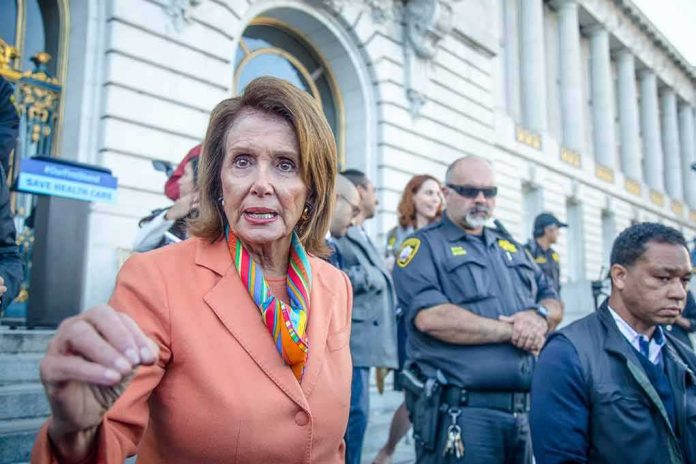
Nancy Pelosi’s departure from Congress after nearly four decades could unleash something far worse for San Francisco than even her most controversial moments as Speaker.
Story Overview
- Nancy Pelosi announces she will not seek reelection in 2026, ending a 39-year congressional career
- San Francisco’s 11th District faces a contentious succession battle with potentially more radical candidates
- The city continues spiraling with crime, homelessness, and business exodus under Pelosi’s watch
- Political observers warn her replacement could accelerate San Francisco’s decline with even more extreme policies
The End of an Era, The Beginning of Something Worse
Pelosi’s announcement sent shockwaves through Democratic circles, but not for the reasons you might expect. The concern isn’t losing her experience or institutional knowledge. The fear gripping moderate Democrats and San Francisco business leaders is that her successor could push the city further into progressive extremism. With Republicans comprising only 7% of district voters, the Democratic primary will essentially determine who represents one of America’s most troubled major cities.
West Coast, Messed Coast™ — Nancy Bows Out, But Meet the Even Worse Guy Who Could Replace Her https://t.co/MK6zkl47bo
— Victoria Taft, The Adult in the Room, FITF Squad (@VictoriaTaft) November 7, 2025
The timing couldn’t be worse for a city hemorrhaging residents and businesses. Major retailers have fled downtown San Francisco, citing rampant theft and safety concerns. Tech companies that once called the city home are relocating operations elsewhere. Yet instead of addressing these crisis points, potential successors are positioning themselves as champions of even bolder progressive reforms.
A Legacy Written in Urban Decay
Pelosi’s nearly four-decade tenure coincided with San Francisco’s transformation from a vibrant cultural center into a cautionary tale of urban mismanagement. The woman who famously tore up President Trump’s State of the Union address in 2020 showed more passion for national political theater than solving her own district’s problems. Her recent public statements focus on attacking Trump and Project 2025 rather than addressing the homeless encampments, retail theft, and affordability crisis plaguing her constituents.
The numbers tell a devastating story. Housing costs have skyrocketed beyond the reach of middle-class families, forcing a mass exodus of working residents. Property crime rates have surged as progressive prosecutors implemented lenient policies. Small businesses struggle to survive in an environment where shoplifting has been effectively decriminalized. These aren’t abstract policy debates—they’re daily realities that Pelosi’s leadership failed to address.
The Candidates Who Could Make Things Worse
Early speculation about potential successors reads like a progressive activist wish list rather than a roster of pragmatic problem-solvers. Names being floated include former tech executives who’ve embraced radical wealth redistribution policies and local political figures who view San Francisco’s current problems as symptoms of insufficient progressive reform. The prospect of candidates even further left than Pelosi has moderate Democrats quietly panicking.
The Democratic establishment faces a nightmare scenario where primary voters, insulated from the worst effects of failed policies, double down on ideological purity over practical governance. Wealthy tech workers in luxury high-rises can afford private security and premium delivery services. They’re unlikely to prioritize the concerns of small business owners or working families struggling with street-level chaos.
What This Means for America’s Future
San Francisco’s trajectory under Pelosi’s watch serves as a warning about what happens when ideology trumps results. Her potential successors seem determined to accelerate rather than reverse course, treating the city’s decline as evidence that progressive policies haven’t gone far enough. This represents more than local political theater—it’s a test case for whether major American cities can recover from decades of mismanagement.
The stakes extend beyond San Francisco’s borders. As one of the Democratic Party’s most visible districts, the direction chosen by Pelosi’s successor will influence national conversations about urban policy, criminal justice reform, and economic inequality. If voters reward failure with even more extreme policies, it sends a message that accountability means nothing in modern Democratic politics.




